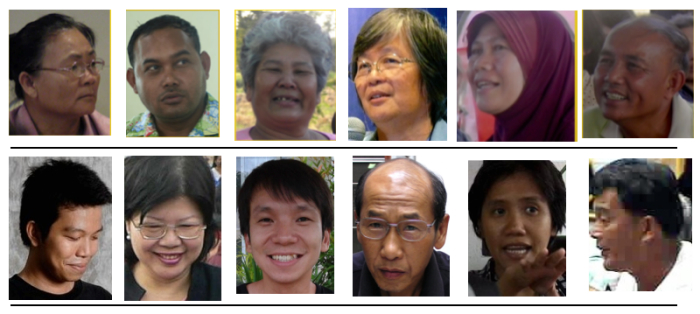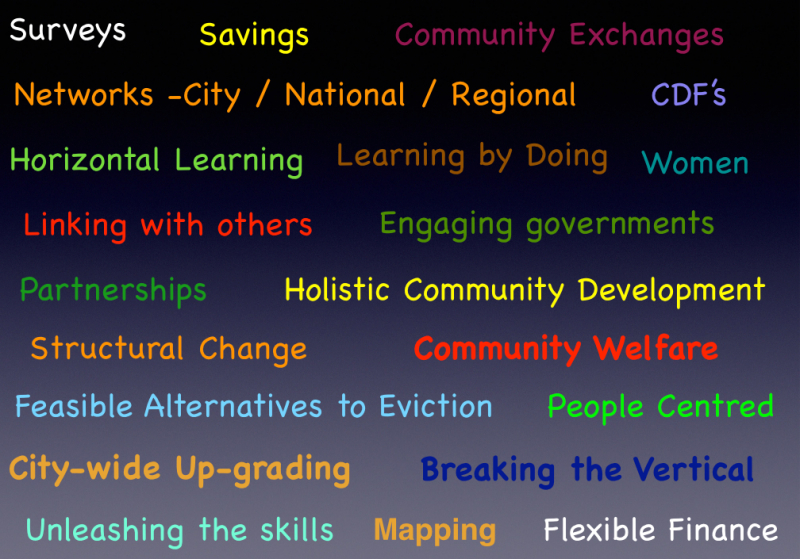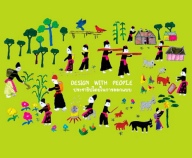- Home
- About us
- Activities
-
About us
- News & Update
- Library
- Countries
- extra
- contact
Thailand
Introduction

Jan 2017:
LEAVE NO ONE BEHIND
Leave no one behind Community-driven urban development in Thailand This paper examines community participation in housing projects for low-income communities in Thailand and how they have sought to ‘leave no one behind’. Baan Mankong, the government slum upgrading programme, is unique in how it has institutionalised participation.
Working Paper : Nausica Castanas, Ploy Kasama Yamtree, Batan Yoswadee Sonthichai and Quentin Batréau PDF 385 KB

Working Paper : Nausica Castanas, Ploy Kasama Yamtree, Batan Yoswadee Sonthichai and Quentin Batréau PDF 385 KB

Thailand Community Finance - July 2017
A 6 page extract from ACHR Research on Community Finance
ACHR / ACCA IN THAILAND
WHY IS THERE A NEED FOR ACCA IN THAILAND ?
Thailand is a rare case in Asia of a country which has been able to get its government to allocate considerable budget for land and housing for the urban poor, and to use that budget to mobilize a national housing upgrading process that is driven entirely by poor communities themselves. This budget goes through the Community Organizations Development Institute (CODI), which is Thailand’s main support system for the poor. For the last ten years, CODI has been passing that budget on to communities, to help them set up savings groups, survey all the slums in their cities, form networks, negotiate for land and develop their own housing projects. CODI’s revolving loan fund gives loans to communities for house construction and land purchasing at 4% interest, and the settlement upgrading projects which people develop all by themselves are partly subsidized by infrastructure grants and technical support from CODI’s Baan Mankong City-wide Upgrading Program.
Today this city-wide upgrading process has been developed in 260 cities and towns around Thailand, and upgrading projects in some 1,200 communities (with 80,000 households) are now either finished or under- way - all being done entirely by communities and community networks in all these different cities. In this city-wide upgrading model in Thailand, the government turns over all the work of solving the housing and land problems to the poor themselves, who plan and implement everything and manage the money.
But one of the drawbacks of having a special kind of national government organization like CODI, which offers such easily- accessible financial support for poor people’s housing and land initiatives on such a wide scale, is that communities in all those cities start feeling a little complacent. There are active community networks in most of the 260 cities already involved in the Baan Mankong Program, with several thousand communities linking together and doing things together. But what these communities haven’t had to do is to build any kind of development fund of their own, at city or district level, as so many other Asian cities are now trying to do. The community savings groups in Thai cities are still scattered, they have no financial links with each other, and there are no city-based funds which mobilize people to put their community savings funds together or to establish their own financial mechanisms.
The funding problems at CODI, which slowed down the national upgrading process for over a year, made community networks all over Thailand realize that even CODI - like all government programs and institutions - is vulnerable to the fickle whims of national politics and that there are good reasons for communities and for cities to begin developing financial mechanisms which they can control themselves, right there within their own constituencies. There have been several national meetings to discuss this crisis and to begin exploring ways for communities in each city to find ways to stand on their own feet, as much as possible. City-based funds, which link together all the savings groups and housing projects in one city (or within a workable constituency) are not just a way of making locally-controlled financial systems for the poor, but of pooling local resources, of strengthening relations between the poor and their local governments, and of pulling other poor communities in the area to join together and to start their upgrading process.
Thailand is a rare case in Asia of a country which has been able to get its government to allocate considerable budget for land and housing for the urban poor, and to use that budget to mobilize a national housing upgrading process that is driven entirely by poor communities themselves. This budget goes through the Community Organizations Development Institute (CODI), which is Thailand’s main support system for the poor. For the last ten years, CODI has been passing that budget on to communities, to help them set up savings groups, survey all the slums in their cities, form networks, negotiate for land and develop their own housing projects. CODI’s revolving loan fund gives loans to communities for house construction and land purchasing at 4% interest, and the settlement upgrading projects which people develop all by themselves are partly subsidized by infrastructure grants and technical support from CODI’s Baan Mankong City-wide Upgrading Program.
Today this city-wide upgrading process has been developed in 260 cities and towns around Thailand, and upgrading projects in some 1,200 communities (with 80,000 households) are now either finished or under- way - all being done entirely by communities and community networks in all these different cities. In this city-wide upgrading model in Thailand, the government turns over all the work of solving the housing and land problems to the poor themselves, who plan and implement everything and manage the money.
But one of the drawbacks of having a special kind of national government organization like CODI, which offers such easily- accessible financial support for poor people’s housing and land initiatives on such a wide scale, is that communities in all those cities start feeling a little complacent. There are active community networks in most of the 260 cities already involved in the Baan Mankong Program, with several thousand communities linking together and doing things together. But what these communities haven’t had to do is to build any kind of development fund of their own, at city or district level, as so many other Asian cities are now trying to do. The community savings groups in Thai cities are still scattered, they have no financial links with each other, and there are no city-based funds which mobilize people to put their community savings funds together or to establish their own financial mechanisms.
The funding problems at CODI, which slowed down the national upgrading process for over a year, made community networks all over Thailand realize that even CODI - like all government programs and institutions - is vulnerable to the fickle whims of national politics and that there are good reasons for communities and for cities to begin developing financial mechanisms which they can control themselves, right there within their own constituencies. There have been several national meetings to discuss this crisis and to begin exploring ways for communities in each city to find ways to stand on their own feet, as much as possible. City-based funds, which link together all the savings groups and housing projects in one city (or within a workable constituency) are not just a way of making locally-controlled financial systems for the poor, but of pooling local resources, of strengthening relations between the poor and their local governments, and of pulling other poor communities in the area to join together and to start their upgrading process.
Strategies that work for communities in Thailand and Asia

Thailand Update December 2014
All the latest ACCA stat.s from Thailand
Using ACCA to start a national city fund movement
Hoe PEOPLE-MANAGED city funds work
National small project fund: Chiang Rai
Using ACCA to fill gaps in a context with an already robust citywide upgrading process
The issues of HOMELESS PEOPLE in the city; of informal communities on State Railway Land; low income communities in HISTORIC CITY CENTRES
All the latest ACCA stat.s from Thailand
Using ACCA to start a national city fund movement
Hoe PEOPLE-MANAGED city funds work
National small project fund: Chiang Rai
Using ACCA to fill gaps in a context with an already robust citywide upgrading process
The issues of HOMELESS PEOPLE in the city; of informal communities on State Railway Land; low income communities in HISTORIC CITY CENTRES
As we construct the NEW ACHR website we will add more information on each country. For now please consider the Country Library section below where PDF downloads with copious information is available.
Country Downloads LIBRARY - THAILAND
DECEMBER 2010 Using ACCA to seed a new city-based development fund movement in Thailand
DECMBER 2009 EXTRACT ON THAILAND FROM ACCA 1ST YR REPORT
WHY IS THERE ANY NEED FOR ACCA IN THAILAND?
 5 pages photos and text 624 KBS
5 pages photos and text 624 KBSA CONVERSATION ON UPGRADING
2009 THINKING CITY-WIDE IN CHANTABURI, THAILAND
NOTES ON A VISIT TO THE CITY OF CHANTABURI, THAILAND, APRIL 26, 2009 On April 26, 2009, In the past five years, the city-wide community upgrading process in Chantaburi has transformed a city where the poor and the city used to have nothing to do with each other into a city which is well on the way to achieving secure land and housing for all its poor citizens, through an upgrading process that is managed and implemented by communities themselves, in close partnership with the local govern- ment and other local actors. For that reason, the city makes another very good case-study for the kind of city-wide processes the ACCA Program is trying to promote. The following report gives a brief picture about the visit and the larger city-wide community upgrading process in Chantaburi.
 9 pages photos and text PDF 1.8 MBs
9 pages photos and text PDF 1.8 MBs
OCT 2006 URBAN POOR HOUSING DEVELOPMENT ON BANGKOK’S KLONGS:
OCT 2006 URBAN POOR HOUSING DEVELOPMENT ON BANGKOK’S KLONGS:
SECURING TENURE, SUPPORTING COMMUNITY PROCESSES NATTAWUT USAVAGOVITWONG AND PRAYONG POSRIPRASERT
A B S T R A C T This paper describes a project to upgrade living conditions and provide secure tenure in nine “canal settlement” communities in Bangkok. It explains how this was planned and implemented, both on the ground and at the policy level, working with national institutions including the Community Organizations Development Institute (CODI) and the government body that owned the land. The different institutions involved are described, including the savings groups in each of the nine communities and the network of community organizations, which were particularly important for the realization of the project. The paper also discusses how upgrading plans were developed and how conflicts were addressed. IIED article
 13 pages PDF478 KB
13 pages PDF478 KB
2005: BAAN MANKONG: GOING TO SCALE WITH “SLUM” AND SQUATTER UPGRADING IN THAILAND SOMSOOK BOONYABANCHA
2005: BAAN MANKONG: GOING TO SCALE WITH “SLUM” AND SQUATTER UPGRADING IN THAILAND SOMSOOK BOONYABANCHA
CITY-WiIDE UPGRADING:
SUMMARY: This paper describes the ambitious national slum and squatter upgrading programme launched by the Thai government in 2003 and imple- mented through the Community Organizations Development Institute (CODI). The programme centres on providing infrastructure subsidies and housing loans to low-income communities to support upgrading in situ wherever possible and, if not, to develop new homes close by. Support is provided not only to commu- nity organizations formed by the urban poor for projects but also to their networks, to allow them to work with city authorities and other local actors and with national agencies on city-wide upgrading programmes. It seeks to “go to scale “ by supporting thousands of community-driven initiatives within city- wide programmes designed and managed by urban poor networks working in partnership with local actors. The paper gives some background information about CODI and its predecessor the Urban Community Development Office, before describing the national upgrading programme.
 PDF 851 KBS
PDF 851 KBS
SUMMARY: This paper describes the ambitious national slum and squatter upgrading programme launched by the Thai government in 2003 and imple- mented through the Community Organizations Development Institute (CODI). The programme centres on providing infrastructure subsidies and housing loans to low-income communities to support upgrading in situ wherever possible and, if not, to develop new homes close by. Support is provided not only to commu- nity organizations formed by the urban poor for projects but also to their networks, to allow them to work with city authorities and other local actors and with national agencies on city-wide upgrading programmes. It seeks to “go to scale “ by supporting thousands of community-driven initiatives within city- wide programmes designed and managed by urban poor networks working in partnership with local actors. The paper gives some background information about CODI and its predecessor the Urban Community Development Office, before describing the national upgrading programme.
2005 BANN MANKONG HANDBOOK ON CITY WIDE UP-GRADING
The Handbook details City Wide Upgrading in 13 Cities in Thailand. As requested by those who attended the HABITAT DAY events in Bangkok October 2005.
2004 DEEPENING COMMUNITY WELFARE IN THAILAND
Cconversation with Somsook Boonyabancha * Between September 2 and 4, 2004, CODI organized a national seminar of 700 key community leaders from all over Thailand on community-driven welfare in Bangkok. The idea was to discuss and reflect on the community welfare activities already going on in urban and rural communities, and to find ways to deepen and broaden this movement. The theme of the seminar was "Community welfare: Solving poverty at the roots." Here are some thoughts on what was discussed, and on Thailand's growing community welfare movement, from CODI's director, Somsook Boonyabancha.

More Information __________________
More Information __________________
CODI web site English Bangkok Post Newspaper The Nation Newspaper
Here's some English language downloads from CODI - housing projects Many are ACHR replications.
Here's some English language downloads from CODI - housing projects Many are ACHR replications.
If you have recommendations for more information and resources on Thailand's urban poor development please contact us at the link in the banner above above
Extra Thailand - Video
Watch Now
THE WAY TO END SLUMS: THAILAND EXTRACT
Published on Jan 29, 2013
Video Coming Soon:
A Rural Community Planning Project 4:20 Mins. 2013. A film by Kon Jai Baan (Community Planning)
Earlier Video compilation:
DESIGN WITH PEOPLE
Young Thai Architects facilitate community plans and process
These documentaries shows stories of people from various communities, mostly in southern Thailand. Central to this is faith in people’s potential to determine their lives. Instead of reproducing a nostalgic image of community, the films illustrate today’s realities of the ways in which people fight for housing rights through participatory planning, the making of a communal passage way, the making of communities on lands that by legal definition are state property. Amidst sudden adversity and structural injustice, ordinary peoples empower themselves by creating trans-local cooperation, including dialogue and suggestions from community architects via a deliberative process. In this series, this documentary not only present an on-going search for new meaning of community in Thai society, but it also addresses the transformation of society from below.
Notes by Sirote Klampaiboon - Political Scientist Films by Pisut Srimhok and Chawanad Luansang
 1. Mapping and Community Survey in Saturn Province Thailand - 55 mins
1. Mapping and Community Survey in Saturn Province Thailand - 55 mins
2. My Community: Relocation in Yala province 2004 -2005 - 44 mins
3. Kaleetapee community - 2010 Upgrading the community; re-generating the city - 26 mins
4. Learning from the Tsunami Disaster in Thailand - 2005 in Pang Nga Thailand - 70 mins
5. Build the Home , Grow the Community in Koh Mook Island Trang province, Thailand - 88 mins
THE WAY TO END SLUMS: THAILAND EXTRACT
Published on Jan 29, 2013
Community leader Prapas Saengpradab reveals how his Bangkok slum turned itself from being under threat of eviction to an attractive canalside community.
6 mins View it HEREVideo Coming Soon:
A Rural Community Planning Project 4:20 Mins. 2013. A film by Kon Jai Baan (Community Planning)
Earlier Video compilation:
DESIGN WITH PEOPLE
Young Thai Architects facilitate community plans and process
These documentaries shows stories of people from various communities, mostly in southern Thailand. Central to this is faith in people’s potential to determine their lives. Instead of reproducing a nostalgic image of community, the films illustrate today’s realities of the ways in which people fight for housing rights through participatory planning, the making of a communal passage way, the making of communities on lands that by legal definition are state property. Amidst sudden adversity and structural injustice, ordinary peoples empower themselves by creating trans-local cooperation, including dialogue and suggestions from community architects via a deliberative process. In this series, this documentary not only present an on-going search for new meaning of community in Thai society, but it also addresses the transformation of society from below.
Notes by Sirote Klampaiboon - Political Scientist Films by Pisut Srimhok and Chawanad Luansang
 1. Mapping and Community Survey in Saturn Province Thailand - 55 mins
1. Mapping and Community Survey in Saturn Province Thailand - 55 mins2. My Community: Relocation in Yala province 2004 -2005 - 44 mins
3. Kaleetapee community - 2010 Upgrading the community; re-generating the city - 26 mins
4. Learning from the Tsunami Disaster in Thailand - 2005 in Pang Nga Thailand - 70 mins
5. Build the Home , Grow the Community in Koh Mook Island Trang province, Thailand - 88 mins
Available on request from ACHR or CAN




